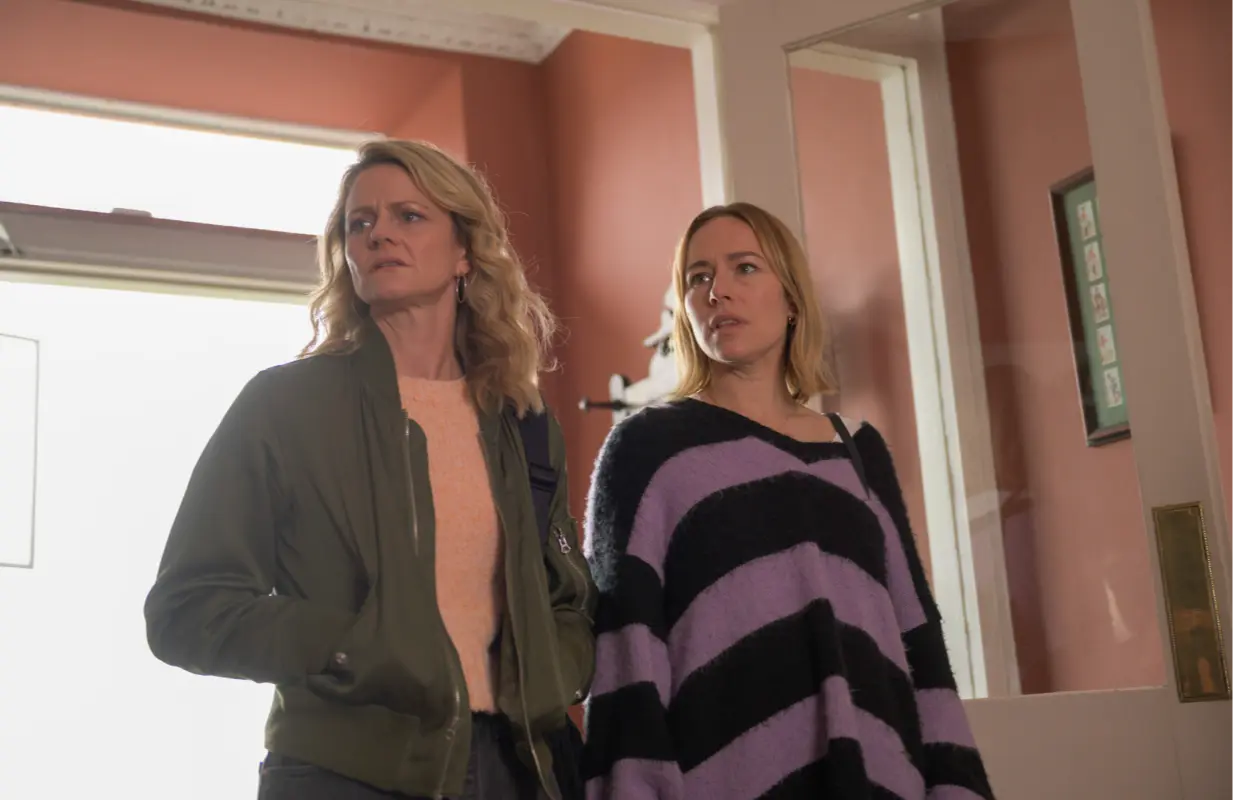Blood and Laughs Dominate Sarah Goldberg's Bewitching Barry Follow-Up Sisters
-
 Susan Stanley and Sarah Goldberg in Sisters (Photo: IFC)
Susan Stanley and Sarah Goldberg in Sisters (Photo: IFC)As they’ve discussed the inspirations for their comedy Sisters (or SisterS as it’s stylized in promotional materials), co-creators and stars Sarah Goldberg and Susan Stanley have mentioned women like Sharon Horgan, Phoebe Waller-Bridge, and Michaela Coel, and anyone who watches the IFC series will see the similarities right away. Just like Bad Sisters, Fleabag, and I May Destroy You, the new show uses the brutal truths of women’s lives to tell a dark, funny story in a formally daring way. It’s equally telling, however, that Goldberg and Stanley have also name-checked Sarah Kane, the cult favorite British playwright whose violent, dreamlike images express the dangers of being alive. If Kane had written a comedy, then it might have been one like Sisters, which threads feral images into domestic hijinks and splashes zany characters with blood.
In the beginning, this wildness is undetectable. The show’s first two episodes tell a straightforward story about Sare (Goldberg), a Canadian lawyer who learns her biological father isn’t the man who raised her. In fact, her genetic dad is an Irish pub singer named Jimmy (Donal Logue), and once she learns he exists, she flies across the Atlantic to find him. Before she gets to Jimmy, though, she meets her half-sister Suze (Stanley), who’s a few years older and much less together. Suze is behind on her rent and up to no good, and there’s immediate comedy in watching the success and the screw-up realize they’re related. Soon enough, Sare gets Suze out of a financial jam, and as payback, she makes Suze drive her to Donegal to search for their dad.
Even if it stayed in this lane, the show would be delightful. There’s a constant stream of sarcastic jokes in the Irish style, where everybody says blunt things in a charming way, and there’s a nice running bit about characters insisting Sare’s an American, no matter how many times she reminds them she’s Canadian. Stanley’s a master of this wry delivery, and she makes it clear that even when she’s falling apart, Suze is the smartest person in the room. She’s a winning foil to Goldberg, who plays up Sare’s politeness and her pathological need to ask strangers questions about themselves. (It’s a sharp turn from her remarkable work as the narcissistic Sally Reed on Barry.). The actresses have a long history together — they met decades ago in drama school — and the result is an easy chemistry that could power multiple seasons.
Then comes Episode 3. It begins with a disorienting dream sequence, in which Sare sees her parents as twentysomethings at a picnic, then wakes up to discover her pants are soaked with blood. It turns out that before she came to Ireland she took a morning-after pill — which she calls a “mini-abortion” — and now the effects are finally kicking in. This is played for laughs, including a scene in which the women have to explain the mess to a group of devout Catholics that they ask for help.
But as funny as it is, the sequence also upends our expectations of both Sare’s character and the show itself. Prior to this, we didn’t even know Sare was pregnant, but soon enough, she reveals an avalanche of problems she’s been trying to escape back home. We also didn’t know the series could mingle body horror, trippy dreams, and feminist political arguments with the wackiness of a road-trip buddy comedy.
The dark vein gets wider from there, thanks to revelations about Suze’s past, her own mother’s abusive relationship, and Jimmy’s drink-induced cruelty. The comedy never stops, but the levity always rubs against sharp edges.
And the unreal moments aren’t always confined to dreams. Even in the first episode, Suze and Sare do certain things alike, like brushing their hair behind their ears in the same way. But by the end of the season, their similarities are pushed to choreographed extremes. They sit the same, have the same expression, move their arms in the same way, and say the same things at the same time. This is tantalizing because it’s not exactly clear what it means: Are they two halves of the same person? Are they connected by their shared parentage and shared pain? Are they perhaps becoming so trapped in their roles as directionless women that they’re turning into machines? The series doesn’t say.
The lack of exposition is a strength. We don’t need a load of backstory to understand the essential fact that Sare and Suze are running from things, nor do we need a long speech from Jimmy to comprehend that when he drinks, he becomes a different, nastier person. We can plainly see these layers, and the actors can play them with enough nuance to make them true.
This refusal to over-explain also adds heft to the show’s stranger elements. Because no one acknowledges their prophetic dreams or the dog that seems to follow them across the country, it’s actually easier to accept that in Sisters, the world is a little bit magical. This recalls the fox that trots around in Fleabag, the horror imagery that permeates I May Destroy You, and the disembodied head in Sarah Kane’s Blasted. Sometimes, metaphorical details feel so real that no one needs to comment on them.
Sisters premieres May 17 at 11:00 PM ET on IFC, with new episodes airing weekly. On May 17, the full season streams on Sundance Now and AMC+.
Mark Blankenship has been writing about arts and culture for twenty years, with bylines in The New York Times, Variety, Vulture, Fortune, and many others. You can hear him on the pop music podcast Mark and Sarah Talk About Songs.
TOPICS: Sisters (2023 series), IFC, Sarah Goldberg, Susan Stanley